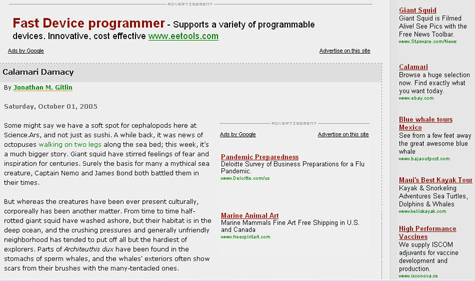Google dependency is risky business

In “Google search kingdom: Benevolent or despotic?” I apply a well worn cliché to Google: “Can’t live with them, can’t kill them.”
As I point out in “Scoring Google on quality,” Google has an uncanny ability to envelope the vast sea of rules, regulations and restrictions it imposes on its advertisers within a touted mantra that “relevant advertising can be as useful as search results” for users.
Google on its “useful” AdSense advertising:
Thousands of web site managers take advantage of our Google AdSense program to deliver ads relevant to the content on their sites… enhancing the experience for their users...
Google AdSense is a fast and easy way for website publishers of all sizes to display relevant, unobtrusive Google ads on their website's content pages and earn money. Because the ads are related to what your users are looking for on your site, you'll finally have a way to both monetize and enhance your content pages.
In the Google world, the Web page below consisting of one-third blog content and two-thirds Google ads, is an enhanced by Google AdSense Web experience for readers of the blog.

The eight Google ads surrounding the one blog story about “cephalopods” hawk the assorted likes of:
ISCOM adjuvants for vaccine development
Find exactly what you want today at ebay
Free news toolbarSurvey of business preparations for a flu pandemic
Fast device programmer
Contrary to Google’s assertions, the AdSense “Ads by Google” are not unobtrusive and do not appear to enhance the content page. Additionally, contrary to Google’s assertions, AdSense is not an unequivocally “fast and easy way” to earn money.
It is also not without risks.
COMPETITIVE RISK
Google acknowledges “there may be situations in which you don't want to display particular advertisements - for example, you may wish to block ads leading to competitors' sites” and offers a “Competitive Ad Filter.
The filter is described as providing “the functionality to block specific ads from appearing on your pages.” At the same time, however, Google disclaims the filtering functionality of the filter:
Please note that Google does not commit that all ads for the websites that you add to your competitive ad filter list or ads containing objectionable content will be prevented from display on your site.
PROPRIETARY RISK
In “Scoring Google on quality” I put forth “it seems counterintuitive for an advertising medium to integrate a robust advertising rejection platform into its business model, but Google proudly underscores it ‘has chosen to ignore conventional wisdom in designing its business.’
Google requires its advertisers prove to Google that its contemplated ads are “eligible to compete in the ad auction.” How?:
Active: Your ad is eligible to run in the search ad auction (your maximum CPC bid is above the minimum CPC bid required).
OR
Inactive for search: Your ad isn't eligible to run on Google or our search network partners (your maximum CPC bid is below the minimum).To activate a keyword that is inactive for search, you'll need to either increase your Quality Score with optimization or increase your maximum CPC bid.
For all of Google’s talk of “quality,” the Google bottom line is that higher cost-per-click bids win the privilege of buying ads from Google.
While higher AdWords bids trump all, Google also allows prospective advertisers to compete for the right to buy ads from Google by justifying the worthiness of the Websites they are promoting via a Google derived “Quality Score.” The Google rating of prospective advertisers' Websites deems to certify the “landing page” destination of the desired AdWords ad.
Google advertisers may opt-out of Google’s "Quality Score" judging, but Google cautions against it; Disallowing Google’s Website review will lead Google to raise its minimum CPC:The AdWords system retrieves all advertiser landing pages by default to ensure a fair and consistent review of all advertiser sites within AdWords.We believe that a non-participating advertiser does detract from the user's search experience, and from the overall quality of the AdWords program. While you can exclude your site from review, this will provide us with little information about your landing page's quality and relevance.
Therefore, if you restrict AdWords from visiting your landing pages, you will experience a drop in Quality Scores for your related keywords. (This will cause higher minimum bid requirements for any landing page for which you've restricted access.)
BUSINESS MODEL RISK
Google asserts its influence on the operations of its advertisers, prospective advertisers and publisher “partners” more and more.
Google’s latest AdSense publisher restrictions:
We do not permit Google ads or search boxes to be published on websites that also contain other ads or services formatted to use the same layout and colors as the Google ads or search boxes on that site. Although you may sell ads directly on your site, it is your responsibility to ensure these ads cannot be confused with Google ads.
In “Web 2.0 monetization by Google AdSense, Where is the business model?” I discuss how monetization by Google AdSense offers appealing ready cash inflows to start-ups, but not a long term foundation for sustainable, stand-alone business models.